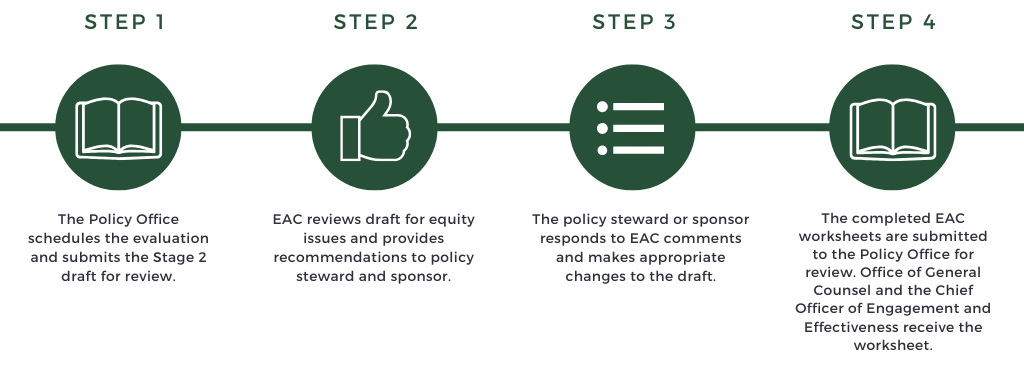Committee Sponsor: Cathy Jordan, Interim Deputy General Counsel
Committee Chair: Cara O’Sullivan, Director, Policy Office
» Contact the Equity Assessment Committee chair
The Equity Assessment Committee (EAC) is a standing committee composed of faculty, staff, and students from across the University with education, experience, and interest in equity issues. The committee includes both appointed representatives from designated university entities and volunteers-at-large from the university community.
As prescribed in Policy 101 Policy Governing Policies, the EAC is a committee of faculty, students, and staff established to review and assess policy drafts through an equity framework to protect, promote, and enrich equal opportunity and diverse viewpoints and to ensure policies are impartial and fair for all members of the university community. The EAC serves to advance Utah Valley University’s commitment to creating and maintaining a supportive infrastructure for inclusion by shaping policies of exceptional care. The EAC will identify and make recommendations to reduce and resolve equity issues that may have an unequal impact on certain members of the university community, where possible.
The EAC reviews and assesses policy drafts through an equity framework to protect, promote, and enrich equal opportunity and diverse viewpoints and to ensure policies are impartial and fair for all members of the university community. The committee assesses all university policy drafts as they go through the development process and existing policies in the Policy Manual to determine whether the drafts contain any equity concerns.
The Equity Assessment Committee (EAC) Review occurs during Stage 2 of the regular policy development process. In this review, the EAC reviews the Stage 2 draft for potential equity issues and provides recommendations to the policy steward and sponsor. Then the policy steward and sponsor make revisions they deem appropriate. This review is done concurrently with the UVU governance entities' review. Once all reviews are completed, the Policy Office then submits the draft to the policy subcommittee and President’s Council for approval.
Note: The Equity Assessment Committee also reviews policies that are currently in the manual. That process is not covered here.

 Step 1 Logistics
Step 1 LogisticsOnce a draft has entered Stage 2, the Policy Office will schedule the Equity Assessment Committee (EAC) evaluation of the draft. The Policy Office is responsible for posting the draft to the EAC Microsoft Teams channel one week before the EAC meeting.
 Step 2 In-Scope and Out-of-Scope Comments
Step 2 In-Scope and Out-of-Scope CommentsBefore the EAC conducts the meeting, all committee members will review the draft and leave comments that are both in- and out-of-scope. All EAC feedback will be guided by the Equity Assessment Rubric and will address the protected groups included in the rubric.
In-scope issues are equity issues the EAC has identified that affect the protected groups included in the Equity Assessment Rubric. The EAC findings will be documented in the EAC Equity Worksheet with possible solutions.
Out-of-scope issues can include editorial concerns, broad questions that cannot be focused on a specific in-scope protected group, and other similar issues. This feedback will be documented in the working draft.
 Step 3 Steward and Sponsor Response
Step 3 Steward and Sponsor ResponseThe Policy Office sends the EAC’s findings to the stewards and sponsors for review. The steward and sponsor will review the EAC’s findings and proposed solutions. The policy owners must respond to all in-scope issues documented on the EAC Equity Worksheet within two weeks. The policy steward must clearly state that they are accepting or rejecting the proposed solutions.
In-Scope Concerns: The policy steward and sponsor must respond to each finding and state how they will mitigate each equity issue. They must then explain how they will implement the accepted proposed solution into the policy draft or why they cannot implement the proposed solution. Some reasons for not implementing proposed solutions might be, for example, the suggested solution would place undue hardship on the University, the suggestion is cost-prohibitive, or another equity issue will arise by resolving the initial one. They can also explain why they may implement or address only part of the proposed solution or give a general timeline for when the equity issues can be addressed.
Out-of-Scope Concerns: The steward and sponsor are not required to respond to the out-of-scope equity concerns and may address them as they see fit. The out-of-scope issues will remain private for the drafting committee’s internal use.
To see examples of completed in-scope and out-of-scope EAC worksheets including the policy steward and sponsor responses, view the Completed EAC Worksheets Example document.
 Step 4 Submit
Step 4 SubmitThe policy steward or sponsor will make the necessary changes before submitting the finalized Stage 2 draft along with the EAC Equity Worksheet with steward responses to the Policy Office for review. In addition, General Counsel and the Chief Officer of Engagement and Effectiveness will receive the EAC Equity Worksheet.
Once the Policy Office review is complete, the policy draft can move to the final step in the regular Stage 2 drafting process: submitting the final draft to policy subcommittee and President’s Council for approval.
The Policy Office will include the EAC worksheet with in-scope findings and responses with the policy draft when the draft is submitted to President’s Council for entrance to Stage 3 Board of Trustees Review. The Policy Office will also post the in-scope issues with the policy draft in the Policy Pipeline during Stage 3 for public viewing.